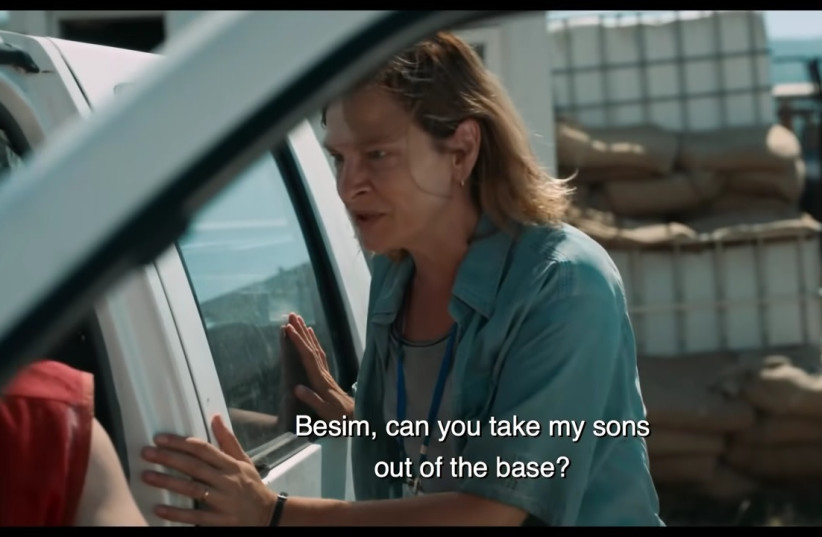As the looming invasion of Ukraine by Russian forces dominates the news, the events portrayed in Jasmila Zbanic’s Quo Vadis, Aida? that opens throughout Israel on February 24, are especially compelling.
Quo Vadis, Aida?, which was nominated for a Best International Feature Oscar and won awards all over the world, is a moving and gripping film about the 1995 massacre of 8,372 men and boys in Srebrenica by Serbian forces. It’s a fiction film with the intensity of documentary and it is based very closely on true events. Its release at this moment is a stark reminder that – although many seem to have forgotten about it – there was a horrific European war not that long ago.
The movie focuses on one woman, Aida (Jasna Djuricic), and the ordeal of her family. She is a Bosnian Muslim translator for a Dutch contingent of UN soldiers in Srebrenica in July 1995. The area is designated as a UN safe haven, but the Serbs take over the town. As more than 25,000 civilians gather at the UN compound, Aida, who is a translator for the Dutch personnel there, searches frantically for her husband, Nihad (Izudin Bajrovic) and her sons, Hamdija (Boris Ler) and Sejo (Dino Bajrovic) among the crowd. Some Muslims have been allowed inside the compound, but she finds her family outside and begs her bosses to allow them in. They say they cannot admit them to the compound, the first of many times they cite rules as a reason why they cannot help. So Aida has to stand by the UN officers and translate their crowd-control commands, while she is desperate to find a way to save the three people she loves.
It is important that this story is set in 1995 and not in the three years earlier when the conflict began, because the Bosnian Muslims know all too well of the atrocities and killings that the Serbs committed against them in the previous few years. There is not a soul in the crowd who believes that when the men get on one bus and the women on another, things are going to be fine when they reach their destinations, as the Serbian commanders promise.
AIDA IS especially worried about her son Hamdija, who has served as a soldier but she is frantic about all the men in her family. Jasna Djurcic gives an extraordinary performance in this role, for which she won a European Film Award and many others, and she infuses her character with a kind of magnificence as she uses her slightly privileged position and every ounce of intelligence and chutzpah she has to try to save them. We should all have someone like Aida in our corner. But this is not about a plucky heroine overcoming challenges. Just as in stories of the Holocaust – and while the Bosnian War is not analogous to the Holocaust in all respects, the situation shown in Srebrenica is probably the moment when it was most similar – the film shows that courage and cunning are helpful but not sufficient to triumph against such a powerful foe. We root for her as the Serbs close in on the compound and the UN personnel, who are outnumbered and outgunned, simply let them do pretty much anything they want, which makes you wonder what exactly they are there for.

The movie is not as gruesome as you might think, especially if you have read reports of the barbaric cruelties that took place just outside the UN compound but it does not need to show gore to emphasize the horrific fate that awaits much of the crowd. The Dutch UN personnel come off particularly badly and even those Dutch soldiers with a conscience were unable or unwilling to stop the Serbs. Investigations into the massacre sparked a national reckoning in Holland when the inactivity and indifference of the UN troops were made public later on. In 2013, the Serbian president apologized for the massacre but refrained from calling it genocide, although most agree it was a textbook case of genocide.
This is a movie that raises complicated questions, some of which are specific to this tragedy and others of which are universal. It is artfully filmed in that it invites the viewer to identify with Aida but at the same time, as much as she is an incredibly strong and likable character, we never lose sight of the fact that there are thousands of people there and that all of them want to save their families just as much as she does.
The final section of the film examines what happens after a tragedy like this takes place and these scenes are especially affecting.
Director Jasmila Zbanic, who was born in Sarajevo in 1974 and lived through the conflict there, has made several previous films that deal with the Bosnian War and its aftermath, including Grbavica, which won the 2006 Golden Bear Award at the Berlin International Film Festival.
This film will make you think about what you would have done in this situation and what anyone can do when faced with cruelty and injustice. As I watch the news this week and see the Russians invade Ukraine – perhaps the situation will be defused but at press time an invasion looks inevitable – I will be thinking about all the Aidas who are caught in the crossfire there.
